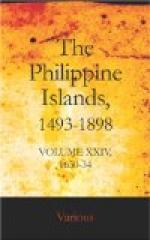[103] Medias anatas: half of the first year’s income; a tax which was paid to the crown upon entering any office, pension, or grant. It was introduced into the Indias by a law of 1632. See Recopilacion leyes de Indias, lib. viii, tit. xix.
[104] Spanish, Religion. This word was first used in the sense of “monastic order” or “monastery” in the sixth century, in France. This narrower sense was used along with the broader one, until the latter was gradually crowded out (during the second half of the fourteenth century); being, however, finally recovered during the epoch of the Reformation; The term “man of religion” (homo religionis, homme de religion) was never used in Latin, French, or English to mean a pious man, but exclusively for a man belonging to a religious order. See “History of the word religio in the Middle Ages,” by. Professor Ewald Fluegel, of Leland Stanford Junior University—an abstract of which is printed in Transactions of American Philological Association, 1902, pp. ci, cii.
[105] Thus in our transcript; but in the king’s answer to this letter (post) the name appears as Rivero.
[106] Probably referring to the people of Butung or boeton, a large island off the southeastern peninsula of Celebes; their state of civilization is similar to that of the Macassar and Bugis of that island.
[107] This recommendation was thus answered by the king, in a despatch to Corcuera dated Madrid, December 1, 1636: “Inasmuch as it is proper that all the prelates take personal charge of the government of their churches, thus fulfilling their so stringent obligations for that, I have thought it best—notwithstanding that I charge them by a decree of the same date as this that, if they should be absent from their churches, they shall without fail go to reside in them—to order you, as I am doing, to see for your part by repeated urgings that they go to reside at and to serve their churches, in case that any of them should be absent.” This is found in the “Cedulario Indico,” at Madrid—pressmark, “Tomo 39, fol. 228.”



